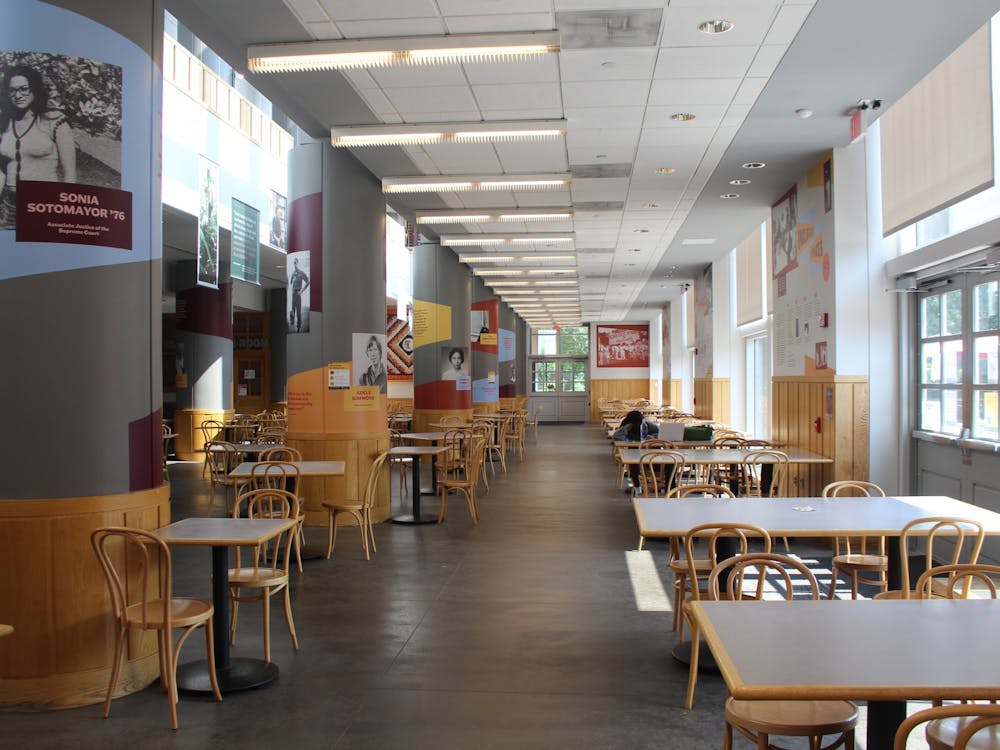The University president: female. The University provost: female. The USG president: also female.
In recent elections, however, the eating clubs have chosen an overwhelming majority of males for their undergraduate officer boards. 51 males and 13 females will hold the elected positions at all of the eating clubs in the coming year. And Alexis Frasz '03, head of Terrace Club, will be the sole female president.
In recent years, a greater number of women have occupied leading positions at eating clubs, with four female presidents out of 11 at the helm in the spring of 2000. But Cap & Gown, the first eating club to have a female president, elected no females to officer positions this year.
The poor turnout for the Cap elections because of the inconvenient meeting time — several hours after dinner — is believed to have contributed to the lack of females elected. Roughly half of the club's members, only 93 people, were present. Only 20-30 of them were female, said a female Cap member who asked not to be identified.
Members said that in past years considerably more women ran for positions. Last year, three out of the seven officers living at Cap were women: the president, vice president and social chair.
Two women, however, were appointed: Debbie Jacobson '03 as outreach chair and Amy Buchen '03 as computer chair.
Amy said she was "surprised" by the overall outcome of the elections because there was considerable female interest in running for positions. One male ran for social chair against a number of females and won.
"There should be a balance," she said. But she added, "I'm confident the guys elected will do a good job."

One female member of Cap who asked not to be identified said she was "disappointed" with the election's turnout. "It doesn't represent the atmosphere of Princeton as a whole," she said. "If everyone had been there, the results would have been different."
Cap president Matt Groh '03 and vice president Joe Tursi '03 refused to comment.
Cynthia Drakeman '02, former chair of the Inter-Club Council, said she believes the male-dominated elections will, "have no effect. It's too early to tell."
She expressed her opinion that, despite the switchover in administration, the 'Street' will stay the same. "A handful of people can't change the atmosphere of the University," she said.

Additionally, she emphasized the importance of recent panel discussions in promoting awareness of women's issues. From her past experience as Tower president, she maintained, "One of the most important roles of the president is to make everyone comfortable."
Next door at Cottage, Rachel Wagner '03 secured the position of social chair. Several members said girls at the club need to vote in block in order to ensure a token girl is elected.
Representation in officer corps allows women to have a say in issues including weekend events, when the club will be on tap, food selection and member dues. More importantly, Wagner said, "They in all respects represent the club to the University community."
A female Cap member agreed, "Officers do take in a lot of input and represent the needs and wants of members."
Dan Handman '03, president of Campus, said, "We take our role very seriously."
A relatively high percentage of elected officers at Campus are female, two out of five. Handman supported the involvement of women in club life, saying, "Women should feel as comfortable here as any other member." Concerning the unequal balance of officers in the other clubs, Handman maintained that "each club takes its own action" as a private institution.
At Terrace, member Kate Schirmer '03 expressed satisfaction with the new female president. Terrace last had a female president two years ago.
Schirmer said that at Terrace, where the numbers of male and female members are approximately equal, in general "voices are heard around the club" which is "receptive to the needs of women." Schirmer is a member of OWL, an organization in which Frasz also is active.
When asked about the overall opportunities for women on campus, Schirmer said anything is possible "if you want to make your presence known."
Colonial was the first eating club to admit females in 1969, the year women first appeared on campus. Ivy and Tiger Inn were the last to follow its example, when in 1990, the New Jersey Supreme Court ruled that they could not deny women membership. The ruling was made in response to a suit Sally B. Frank '80 had filed against the two clubs and Cottage in 1978.







